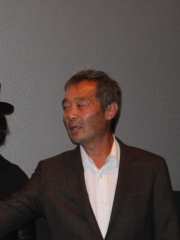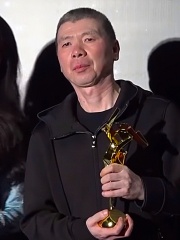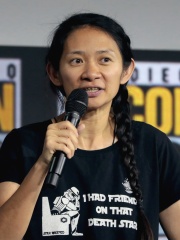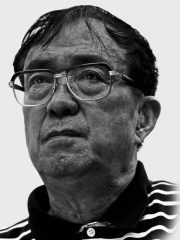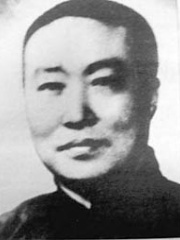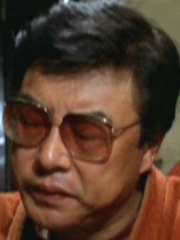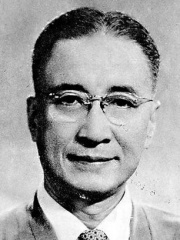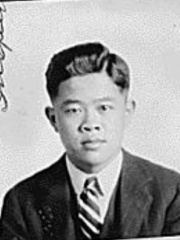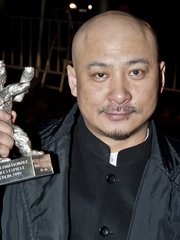

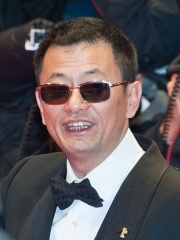
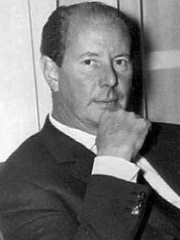

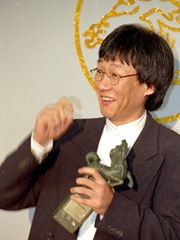
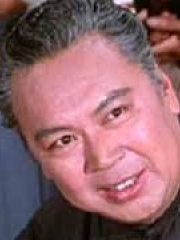

The Most Famous
FILM DIRECTORS from China
This page contains a list of the greatest Chinese Film Directors. The pantheon dataset contains 2,041 Film Directors, 28 of which were born in China. This makes China the birth place of the 15th most number of Film Directors behind Hungary, and Czechia.
Top 10
The following people are considered by Pantheon to be the top 10 most legendary Chinese Film Directors of all time. This list of famous Chinese Film Directors is sorted by HPI (Historical Popularity Index), a metric that aggregates information on a biography's online popularity. Visit the rankings page to view the entire list of Chinese Film Directors.

1. Zhang Yimou (b. 1950)
With an HPI of 70.63, Zhang Yimou is the most famous Chinese Film Director. His biography has been translated into 53 different languages on wikipedia.
Zhang Yimou (simplified Chinese: 张艺谋; traditional Chinese: 張藝謀; pinyin: Zhāng Yìmóu; born 14 November 1950) is a Chinese filmmaker. He made his directorial debut with Red Sorghum (1987), which won the Golden Bear at the Berlin International Film Festival. Since then, he has established himself as a leading figure of China's Fifth Generation directors and one of the most successful directors in the world. Just like in his debut film, he went on to collaborate with actress Gong Li in films like Raise the Red Lantern (1991) and To Live (1994). The Road Home (1999) marked the cinematic debut of another popular Chinese actress, Zhang Ziyi. Beginning with Hero (2002), which ushered the Chinese film industry into the era of big-budget blockbusters, his work increasingly reflected an interest in grand narratives and critical engagement with politics and history, as in House of Flying Daggers (2004), Curse of the Golden Flower (2006), The Flowers of War (2011), The Great Wall (2016) (his highest-budgeted film to date, which became his greatest bomb) and Shadow (2018). One of Zhang’s early recurring themes is the resilience of ordinary people, as in To Live (1994). His films are also noted for their rich use of colour, as in Raise the Red Lantern (1991) and House of Flying Daggers (2004), and for their portrayals of women that propelled “Mou Girls” to stardom, such as Gong Li, Zhang Ziyi and Ni Ni. Since 2004, Zhang has collaborated with local governments across China to promote tourism through the “Impression” series of outdoor live stage productions, beginning with Impression Liu Sanjie in Yangshuo. Despite his frequent official affiliations, Zhang has, at various points in his career, fallen foul of Chinese censors. Zhang directed the opening and closing ceremonies of the 2008 Beijing Summer Olympic Games as well as the opening and closing ceremonies of the 2022 Beijing Winter Olympic Games. Zhang was awarded an honorary doctorate from Yale University in 2010 and from Boston University in 2018. In 2022, he joined the Beijing Film Academy as a distinguished professor.

2. John Woo (b. 1946)
With an HPI of 70.23, John Woo is the 2nd most famous Chinese Film Director. His biography has been translated into 44 different languages.
John Woo Yu-sen (Chinese: 吳宇森; born 22 September 1946) is a Hong Kong film director known as a highly influential figure in the action film genre. The recipient of various accolades, including a Hong Kong Film Award for Best Picture, Best Director, and Best Editing, as well as a Golden Horse Award, an Asia Pacific Screen Award and a Saturn Award, he is regarded as a pioneer of heroic bloodshed films and the gun fu genre in Hong Kong action cinema. He is known for his highly chaotic "bullet ballet" action sequences, stylized imagery, Mexican standoffs, frequent use of slow motion and allusions to wuxia, film noir and Western cinema. Considered one of the major figures of Hong Kong cinema, Woo has directed several notable action films. He is known for his collaborations with actor Chow Yun-fat in five Hong Kong action films: A Better Tomorrow (1986), which made Chow a box-office superstar in Asia, A Better Tomorrow II (1987), The Killer (1989), Once a Thief (1991), and Hard Boiled (1992). He has also directed martial arts films such as The Dragon Tamers (1975), Hand of Death (1976), and Last Hurrah for Chivalry (1979), and action comedies such as Follow the Star (1978), From Riches to Rags (1980), Run, Tiger, Run (1984), and the aforementioned Once a Thief. Hard Target (1993), starring Jean-Claude Van Damme, was his American directorial debut, and the first major Hollywood film directed by a Chinese – and more broadly, Asian – filmmaker. His other Hollywood films include Broken Arrow (1996), Face/Off (1997) and Mission: Impossible 2 (2000). He made his Canadian debut with the action comedy film Once a Thief (1996), which is a remake of Woo's 1991 film of the same name. He continued to be active in Hong Kong cinema, directing films such as the two-part historical epic The Crossing (2014). His first Chinese-language feature since Hard Boiled (1992) was the internationally co-produced Red Cliff (2008–2009), which broke the Chinese box office record previously held by Titanic in mainland China. Woo is the creator of the comic series Seven Brothers, published by Virgin Comics. He is the founder and chairman of the production company Lion Rock Productions.

3. Wong Kar-wai (b. 1958)
With an HPI of 68.88, Wong Kar-wai is the 3rd most famous Chinese Film Director. His biography has been translated into 51 different languages.
Wong Kar-wai (born 17 July 1958) is a Hong Kong film director, screenwriter, and producer. His films are characterised by nonlinear narratives, atmospheric music, and vivid cinematography with bold, saturated colours. A pivotal figure of Hong Kong cinema, Wong is considered a contemporary auteur and ranked third on Sight and Sound's 2002 poll of the greatest filmmakers of the previous 25 years. His films frequently appear on best-of lists domestically and internationally. Born in Shanghai, Wong emigrated to Hong Kong as a child with his family. He began a career as a screenwriter for soap operas before transitioning to directing with his debut, the crime drama As Tears Go By (1988). As Tears Go By was fairly successful in Hong Kong, but Wong moved away from the contemporary trend of crime and action movies to embark on more personal filmmaking. Days of Being Wild (1990), his first venture in such a direction, did not perform well at the box office, but received critical acclaim and won Best Film and Best Director at the 1991 Hong Kong Film Awards. His next film, Ashes of Time (1994), met with a mixed reception because of its vague plot and atypical take on the wuxia genre. Exhausted by the time-consuming filming and post-production of Ashes of Time, Wong directed Chungking Express (1994), a smaller film that he hoped would rekindle his love of cinema during a two-month sabbatical while waiting for post-production equipment to arrive for Ashes of Time. The film, with its more lighthearted atmosphere, catapulted Wong to international prominence, and won Best Film and Best Director at the 1995 Hong Kong Film Awards. Wong followed up with the crime thriller Fallen Angels in 1995. Although it was initially tepidly received by critics, Fallen Angels has since come to be considered a cult classic of the Golden Age of Hong Kong cinema and especially representative of Wong's style. Wong consolidated his worldwide reputation with the 1997 drama Happy Together, for which he won Best Director at the Cannes Film Festival. The 2000 drama In the Mood for Love, revered for its lush visuals and subtle storytelling, concretely established Wong's trademark filmmaking style. Among his other works are 2046 (2004) and The Grandmaster (2013), both of which received awards and nominations worldwide.

4. Terence Young (1915 - 1994)
With an HPI of 65.48, Terence Young is the 4th most famous Chinese Film Director. His biography has been translated into 37 different languages.
Stewart Terence Herbert Young (20 June 1915 – 7 September 1994) was a British film director and screenwriter who worked in the United Kingdom, Europe and Hollywood. He is best known for directing three James Bond films: the first two films in the series, Dr. No (1962) and From Russia with Love (1963), and Thunderball (1965). His other films include the Audrey Hepburn thrillers Wait Until Dark (1967) and Bloodline (1979), the historical drama Mayerling (1968), the infamous Korean War epic Inchon (1981), and the Charles Bronson films Cold Sweat (1970), Red Sun (1971), and The Valachi Papers (1972).
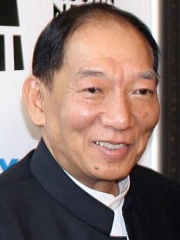
5. Yuen Woo-ping (b. 1945)
With an HPI of 64.56, Yuen Woo-ping is the 5th most famous Chinese Film Director. His biography has been translated into 24 different languages.
Yuen Woo-ping (Chinese: 袁和平; pinyin: Yuán Hépíng; alias: Yuen Wo-ping; born 24 August 1945) is a Hong Kong martial arts choreographer and film director who worked in Hong Kong action cinema and later Hollywood films. He is one of the inductees on the Avenue of Stars in Hong Kong. Yuen is also a son of Yuen Siu-tien, a martial arts film actor. He attended the China Drama Academy for one year as a day student of Master Yu Jim-yuen as well.

6. Chen Kaige (b. 1952)
With an HPI of 64.24, Chen Kaige is the 6th most famous Chinese Film Director. His biography has been translated into 36 different languages.
Chen Kaige (Chinese: 陈凯歌; born 12 August 1952) is a Chinese filmmaker. A leading figure of the fifth generation of Chinese directors, Chen is known for his visual flair and epic storytelling. For Farewell My Concubine (1993), Chen became the first Chinese director to win the Palme d'Or at the Cannes Film Festival.

7. Edward Yang (1947 - 2007)
With an HPI of 63.82, Edward Yang is the 7th most famous Chinese Film Director. His biography has been translated into 26 different languages.
Edward Yang (Chinese: 楊德昌; pinyin: Yáng Déchāng; November 6, 1947 – June 29, 2007) was a Taiwanese and American filmmaker. He rose to prominence as a pioneer in the Taiwanese New Wave of the 1980s, alongside fellow auteurs Hou Hsiao-hsien and Tsai Ming-liang. Yang was regarded as one of the greatest filmmakers of Taiwanese cinema. He won the Best Director Award at Cannes for his 2000 film Yi Yi.

8. Lo Wei (1918 - 1996)
With an HPI of 63.00, Lo Wei is the 8th most famous Chinese Film Director. His biography has been translated into 22 different languages.
Lo Wei ( 12 December 1918 – 20 January 1996) was a Hong Kong film director and actor best known for launching the martial arts film careers of both Bruce Lee, in The Big Boss and Fist of Fury, and Jackie Chan, in New Fist of Fury.

9. Ann Hui (b. 1947)
With an HPI of 60.31, Ann Hui is the 9th most famous Chinese Film Director. Her biography has been translated into 26 different languages.
Ann Hui On-wah (Chinese: 許鞍華; born 23 May 1947) is a Hong Kong filmmaker and actress. One of the most critically acclaimed filmmakers of the Hong Kong New Wave, she is known for her films about social issues in Hong Kong which include literary adaptations, martial arts, semi-autobiographical works, women's issues, social phenomena, political changes, and thrillers. She served as the president of the Hong Kong Film Directors' Guild from 2004 to 2006. Hui has won numerous awards. She won Best Director at the Golden Horse Awards three times (1999, 2011, 2014); Best Film at the Asia Pacific Film Festival; and Best Director at the Hong Kong Film Awards six times (1983, 1996, 2009, 2012, 2015, 2018). Only two films have won a Grand Slam (Best Picture, Best Director, Best Screenplay, Best Actor, and Best Actress) at the Hong Kong Film Awards; they are Summer Snow and A Simple Life, both directed by Ann Hui. She was honored for her lifetime accomplishments at the 2012 Asian Film Awards. In 2017, the US based Academy of Motion Picture Arts and Sciences invited Hui to become a member.

10. King Hu (1932 - 1997)
With an HPI of 60.03, King Hu is the 10th most famous Chinese Film Director. His biography has been translated into 21 different languages.
King Hu Jinquan (Chinese: 胡金銓, 29 April 1932 – 14 January 1997) was a Chinese filmmaker and actor, based in Hong Kong and Taiwan. He is known for directing various wuxia films in the 1960s and 1970s, which brought Hong Kong and Taiwanese cinema to new technical and artistic heights. His films Come Drink with Me (1966), Dragon Inn (1967), and A Touch of Zen (1970–1971) inaugurated a new generation of wuxia films in the late 1960s. The Harvard Film Archive described Hu as "one of the most influential and important Chinese directors in the history of cinema".
People
Pantheon has 28 people classified as Chinese film directors born between 1890 and 1989. Of these 28, 19 (67.86%) of them are still alive today. The most famous living Chinese film directors include Zhang Yimou, John Woo, and Wong Kar-wai. The most famous deceased Chinese film directors include Terence Young, Edward Yang, and Lo Wei. As of April 2024, 4 new Chinese film directors have been added to Pantheon including Wang Bing, Wang Quan'an, and Cathy Yan.
Living Chinese Film Directors
Go to all RankingsZhang Yimou
1950 - Present
HPI: 70.63
John Woo
1946 - Present
HPI: 70.23
Wong Kar-wai
1958 - Present
HPI: 68.88
Yuen Woo-ping
1945 - Present
HPI: 64.56
Chen Kaige
1952 - Present
HPI: 64.24
Ann Hui
1947 - Present
HPI: 60.31
Tian Zhuangzhuang
1952 - Present
HPI: 56.50
Jia Zhangke
1970 - Present
HPI: 56.15
Feng Xiaogang
1958 - Present
HPI: 53.94
Chloé Zhao
1982 - Present
HPI: 52.16
Wang Bing
1967 - Present
HPI: 50.47
Lou Ye
1965 - Present
HPI: 50.16
Deceased Chinese Film Directors
Go to all RankingsTerence Young
1915 - 1994
HPI: 65.48
Edward Yang
1947 - 2007
HPI: 63.82
Lo Wei
1918 - 1996
HPI: 63.00
King Hu
1932 - 1997
HPI: 60.03
Xie Jin
1923 - 2008
HPI: 56.32
Zhang Shichuan
1890 - 1954
HPI: 55.14
Li Han-hsiang
1926 - 1996
HPI: 54.01
Cai Chusheng
1906 - 1968
HPI: 53.94
James Wong Howe
1899 - 1976
HPI: 53.38
Newly Added Chinese Film Directors (2025)
Go to all RankingsWang Bing
1967 - Present
HPI: 50.47
Wang Quan'an
1965 - Present
HPI: 45.09
Cathy Yan
1983 - Present
HPI: 35.44
Lulu Wang
1983 - Present
HPI: 31.67
Overlapping Lives
Which Film Directors were alive at the same time? This visualization shows the lifespans of the 8 most globally memorable Film Directors since 1700.

